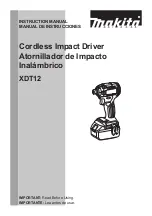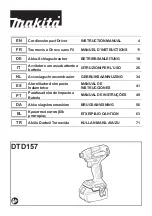
English
14
Table
3
Charging time (At 20°C)
(AC power supply
/
DC 12V (in-car) power supply)
Charger
Battery
UC18YML2
UC18YRSL
UC18YFSL
UC18YGSL
BSL1820
Approx.
30
/
80 min.
Approx.
30 min.
Approx.
60 min.
BSL1430
BSL1830
Approx.
45
/
120 min.
Approx.
45 min.
Approx.
90 min.
BSL1440
BSL1840
Approx.
60
/
160 min.
Approx.
60 min.
Approx.
120 min.
NOTE
The recharging time may vary according to the ambient
temperature and power source voltage.
<UC18YML2>
Especially, using a DC 12V in-car power source may
require longer recharging time at high temperatures.
CAUTION
When the battery charger has been continuously used,
the battery charger will be heated, thus constituting
the cause of the failures. Once the charging has been
completed, give 15 minutes rest until the next charging.
4.
Disconnect
the
charger’s
power
cord
from
the
receptacle
or
cigarette
lighter
socket
5.
Hold
the
charger
fi
rmly
and
pull
out
the
battery.
NOTE
Be sure to pull out the battery from the charger after use,
and then keep it.
How
to
make
the
batteries
perform
longer
(1) Recharge the batteries before they become completely
exhausted.
When you feel that the power of the tool becomes
weaker, stop using the tool and recharge its battery. If
you continue to use the tool and exhaust the electric
current, the battery may be damaged and its life will
become shorter.
(2) Avoid recharging at high temperatures.
A rechargeable battery will be hot immediately after use.
If such a battery is recharged immediately after use, its
internal chemical substance will deteriorate, and the
battery life will be shortened. Leave the battery and
recharge it after it has cooled for a while.
CAUTION
○
If the battery is charged while it is heated because it has
been left for a long time in a location subject to direct
sunlight or because the battery has just been used, the
pilot lamp of the charger lights up green. In such a case,
fi
rst let the battery cool, then start charging.
○
When the pilot lamp
fl
ickers in red (at 0.2-second
intervals), check for and take out any foreign objects in
the charger’s battery connector. If there are no foreign
objects, it is probable that the battery or charger is
malfunctioning. Take it to your authorized Service
Center.
○
Since the built-in micro computer takes about 3 seconds to
con
fi
rm that the battery being charged with UC18YML2
/
UC18YRSL
/
UC18YFSL
/
UC18YGSL is taken out,
wait for a minimum of 3 seconds before reinserting it to
continue charging. If the battery is reinserted within 3
seconds, the battery may not be properly charged.
○
Check the voltage of the in-car power source when
the pilot lamp
fl
ickers in green (every 0.2 seconds)
continuously. (UC18YML2)
If the voltage is 12V or lower, it indicates that the car
battery has weakened and cannot be charged.
○
If the pilot lamp does not blink in red (every second) even
though the charger cord or cigarette lighter connecting
plug is connected to the power, it indicates that the
protection circuit of the charger may be activated.
Remove the cord or plug from the power and then
connect it again after 30 seconds or so. If this does
not cause the pilot lamp to blink in red (every second),
please take the charger to the Hitachi Authorized Service
Center.
PRIOR
TO
OPERATION
1.
Preparing
and
checking
the
work
environment
Make sure that the work site meets all the conditions laid
forth in the precautions.
2.
Checking
the
battery
Make sure that the battery is installed
fi
rmly. If it is at all
loose it could come o
ff
and cause an accident.
3.
Installing
the
bit
Always follow the following procedure to install driver bit.
(
Fig.
5
)
(1) Pull the guide sleeve away from front of the tool.
(2) Insert the bit into the hexagonal hole in the anvil.
(3) Release the guide sleeve and it returns to its original
position.
(4) If you want to remove the bit, pull the guide sleeve away
from front of the tool.
CAUTION
If the guide sleeve does not return to its original position,
then the bit is not installed properly.
HOW
TO
USE
1.
Check
the
rotational
direction
The bit rotates clockwise (viewed from the rear side) by
pushing the R-side of the push button.
The L-side of the push button is pushed to turn the bit
counterclockwise. (See
Fig.
6
) (The
and
marks
are provided on the body.)
2.
Switch
operation
○
When the trigger switch is depressed, the tool rotates.
When the trigger is released, the tool stops.
○
The rotational speed of the drill can be controlled by
varying the amount that the trigger switch is pulled.
Speed is low when the trigger switch is pulled slightly and
increases as the trigger switch is pulled more.
NOTE
A buzzing noise is produced when the motor is about to
rotate. This is only a noise, not a machine failure.
3.
Using
the
hook
The hook is used to hang up the power tool to your waist
belt while working.
CAUTION
○
When using the hook, hang up the power tool
fi
rmly not
to drop accidentally. If the power tool is dropped, it may
lead to an accident.
○
When carrying the power tool with hooked to your waist
belt, do not
fi
t any bit to the tip of power tool. If the sharp
bit such as drill is
fi
tted to the power tool when carrying it
with hooked to your waist belt, you will be injured.
○
Install securely the hook. Unless the hook is securely
installed, it may cause an injury while using.
(1) Removing the hook.
Remove the screws
fi
xing the hook with Philips screw
driver. (
Fig.
7
)
(2) Replacing the hook and tightening the screws.
Install securely the hook in the groove of power tool and
tighten the screws to
fi
x the hook
fi
rmly. (
Fig.
8
)
000Book̲WH14DBEL̲C99209791̲305̲EE.indb 14
000Book̲WH14DBEL̲C99209791̲305̲EE.indb 14
2013/06/13 12:05:07
2013/06/13 12:05:07















































